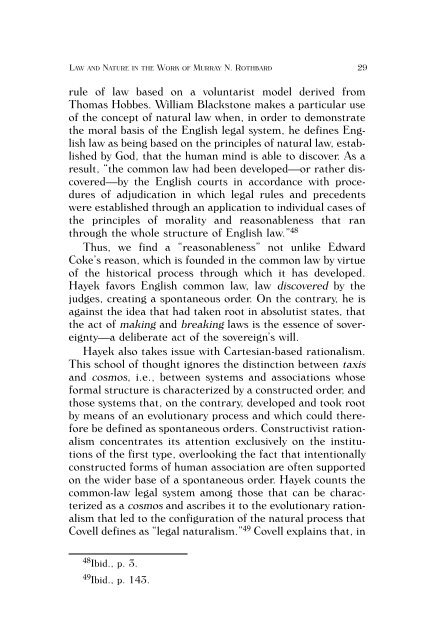Murray N. Rothbard vs. the Philosophers - Ludwig von Mises Institute
Murray N. Rothbard vs. the Philosophers - Ludwig von Mises Institute
Murray N. Rothbard vs. the Philosophers - Ludwig von Mises Institute
Create successful ePaper yourself
Turn your PDF publications into a flip-book with our unique Google optimized e-Paper software.
LAW AND NATURE IN THE WORK OF MURRAY N. ROTHBARD 29<br />
rule of law based on a voluntarist model derived from<br />
Thomas Hobbes. William Blackstone makes a particular use<br />
of <strong>the</strong> concept of natural law when, in order to demonstrate<br />
<strong>the</strong> moral basis of <strong>the</strong> English legal system, he defines English<br />
law as being based on <strong>the</strong> principles of natural law, established<br />
by God, that <strong>the</strong> human mind is able to discover. As a<br />
result, “<strong>the</strong> common law had been developed—or ra<strong>the</strong>r discovered—by<br />
<strong>the</strong> English courts in accordance with procedures<br />
of adjudication in which legal rules and precedents<br />
were established through an application to individual cases of<br />
<strong>the</strong> principles of morality and reasonableness that ran<br />
through <strong>the</strong> whole structure of English law.” 48<br />
Thus, we find a “reasonableness” not unlike Edward<br />
Coke’s reason, which is founded in <strong>the</strong> common law by virtue<br />
of <strong>the</strong> historical process through which it has developed.<br />
Hayek favors English common law, law discovered by <strong>the</strong><br />
judges, creating a spontaneous order. On <strong>the</strong> contrary, he is<br />
against <strong>the</strong> idea that had taken root in absolutist states, that<br />
<strong>the</strong> act of making and breaking laws is <strong>the</strong> essence of sovereignty—a<br />
deliberate act of <strong>the</strong> sovereign’s will.<br />
Hayek also takes issue with Cartesian-based rationalism.<br />
This school of thought ignores <strong>the</strong> distinction between taxis<br />
and cosmos, i.e., between systems and associations whose<br />
formal structure is characterized by a constructed order, and<br />
those systems that, on <strong>the</strong> contrary, developed and took root<br />
by means of an evolutionary process and which could <strong>the</strong>refore<br />
be defined as spontaneous orders. Constructivist rationalism<br />
concentrates its attention exclusively on <strong>the</strong> institutions<br />
of <strong>the</strong> first type, overlooking <strong>the</strong> fact that intentionally<br />
constructed forms of human association are often supported<br />
on <strong>the</strong> wider base of a spontaneous order. Hayek counts <strong>the</strong><br />
common-law legal system among those that can be characterized<br />
as a cosmos and ascribes it to <strong>the</strong> evolutionary rationalism<br />
that led to <strong>the</strong> configuration of <strong>the</strong> natural process that<br />
Covell defines as “legal naturalism.” 49 Covell explains that, in<br />
48Ibid., p. 3.<br />
49Ibid., p. 143.


